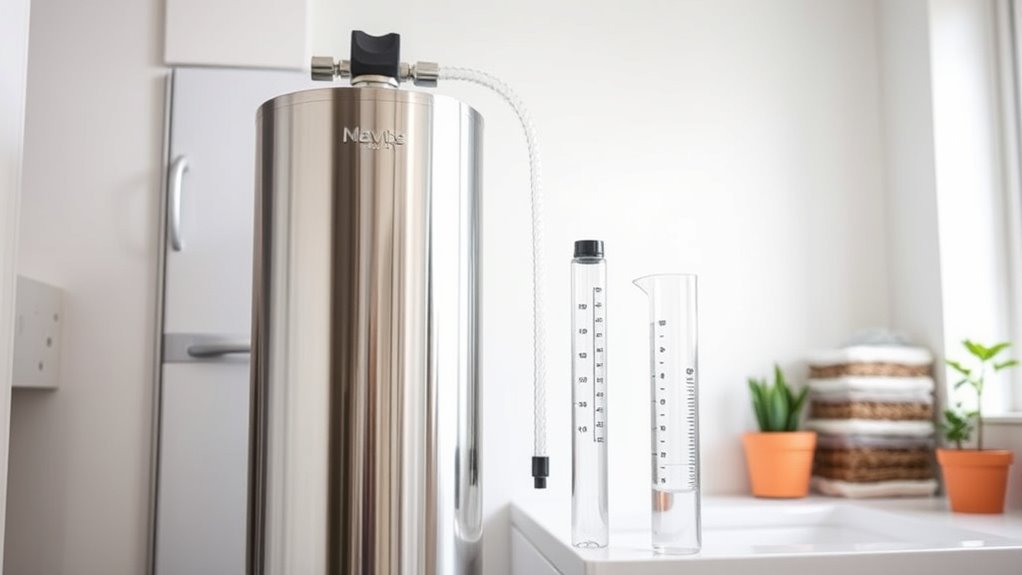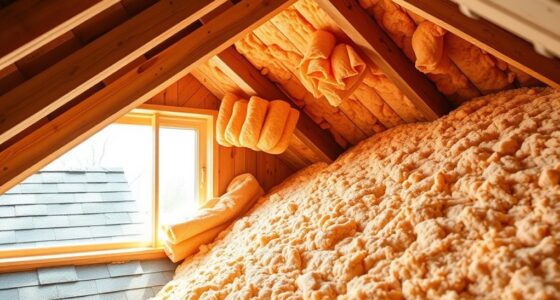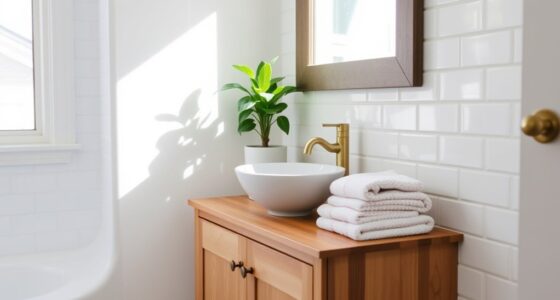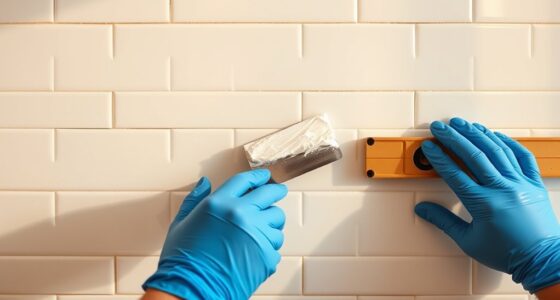If you notice mineral deposits on fixtures, dry skin or hair after bathing, or soap doesn’t lather well, you might need a water softener. It helps by removing minerals like calcium and magnesium, preventing buildup in your plumbing and appliances, and making your skin and hair feel better. Plus, it can save you money on energy and repairs. Want to discover more benefits and how it works? Keep exploring to find out if it’s right for you.
Key Takeaways
- Hard water causes mineral buildup, dry skin, and dull hair, indicating a need for water softening.
- Water softeners use ion exchange to remove calcium and magnesium, preventing scale deposits.
- Benefits include smoother skin, shinier hair, better soap lather, and longer-lasting appliances.
- Financial savings of over $1,550 annually and extended appliance lifespan justify investing in a water softener.
- If you experience mineral deposits or notice dry skin and reduced soap effectiveness, a home water softener is recommended.
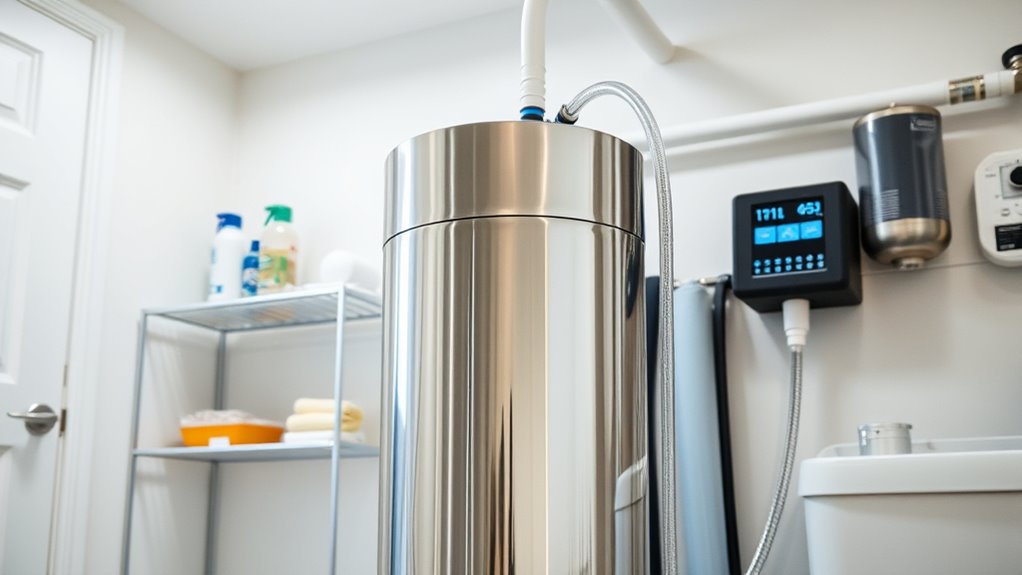
Have you ever noticed mineral deposits on your fixtures or felt that your skin and hair are dry after bathing? If so, you might be dealing with hard water, which can cause scale buildup in your plumbing and appliances, reduce soap’s effectiveness, and leave your skin and hair feeling less than ideal. Installing a home water softener can address these issues, providing numerous benefits that improve your daily life and save you money over time. Water softeners typically use ion exchange technology to swap out calcium and magnesium—minerals responsible for hardness—for sodium or potassium ions. This process prevents mineral buildup, keeps your plumbing clear, and extends the lifespan of your appliances.
Beyond plumbing protection, a water softener offers significant health and wellness advantages. Soft water helps your skin retain moisture, reducing irritation and conditions like eczema or psoriasis. It also makes your hair shinier and silkier because it doesn’t leave mineral residues that cause dryness and dullness. Soap lathers more easily in soft water, meaning you need less product to achieve a thorough clean. This not only saves money on personal care products but also enhances your overall hygiene. Additionally, softer water can make bathing a more pleasant experience, leaving you feeling refreshed and comfortable.
Soft water improves skin and hair health while enhancing hygiene and bathing comfort.
Financially, installing a water softener can lead to substantial savings. On average, a household of four can save over $1,550 annually by reducing energy costs, appliance repairs, and cleaning supplies. The system’s payback period is typically between 20 and 26 months, meaning you start saving almost immediately. Soft water keeps appliances like dishwashers, washing machines, and water heaters functioning efficiently by preventing mineral buildup that causes clogs and damage. This protection extends the life of your appliances and reduces repair and replacement costs, making a softener a smart long-term investment.
Furthermore, soft water benefits your laundry and the environment. It helps preserve clothing colors and fabrics, reducing wear and tear caused by mineral residues. Clothes come out softer, brighter, and with less fading, prolonging their life. Soft water also improves the effectiveness of detergents, allowing you to wash at lower temperatures and use fewer cleaning agents, which is gentler on the environment. Cleaning becomes easier, and you’ll notice a reduction in the amount of soap and detergent needed, resulting in less waste and fewer chemicals entering waterways.
Frequently Asked Questions
How Long Does a Typical Water Softener Last?
A typical water softener lasts between 10 and 15 years, depending on factors like water hardness, usage, and maintenance. You can extend its lifespan by regularly cleaning and servicing it, monitoring salt levels, and ensuring proper installation. Keep an eye out for signs like decreased water pressure, soap scum, or mineral spots, which indicate it might be time for repairs or replacement. Proper care guarantees your system works efficiently longer.
Are Water Softeners Eco-Friendly?
You might think water softeners are eco-friendly, but they often contribute to environmental harm through salt discharge, increasing salinity in water systems and harming aquatic life. While they improve water quality for your home, they can cause long-term ecological issues. Opting for salt-free or potassium-based systems can help reduce this impact, making your water softening more sustainable. It’s worth considering eco-friendly alternatives to protect our environment.
Can Water Softeners Cause Water Taste Issues?
Water softeners can cause taste issues if they’re not maintained properly. You might notice a salty or metallic flavor if the system’s regeneration cycle isn’t working right, or if there’s excess salt buildup. Faulty resin beds or inadequate backwash can also lead to off-flavors. Regular maintenance, checking salt levels, and ensuring proper installation help prevent taste problems, so your water stays clean and pleasant to drink.
What Is the Cost of Professional Installation?
You’re wondering about the cost of professional installation. Typically, it ranges from $200 to $6,000, with the national average around $1,500. Factors like your home size, system type, and regional labor rates influence this. Whole-house systems usually cost more, and complex setups may require additional plumbing or electrical work. Hiring a professional guarantees proper installation, but expect to pay more for larger or more advanced systems.
Do Water Softeners Require Frequent Maintenance?
You’re wondering if water softeners need frequent maintenance. It depends on your water quality, usage, and system type. Regular checks for salt levels and system operation are recommended monthly, with annual professional inspections. If your water’s hard or has iron or sediment, you’ll need more frequent cleaning and maintenance. Keep an eye out for signs like reduced performance or odors, and follow your system’s specific maintenance schedule for ideal results.
Conclusion
Ultimately, considering a home water softener isn’t just about avoiding minor inconveniences. It’s like giving your home a gentle upgrade, helping your appliances and skin feel their best. While it’s not always necessary, many find it’s a small step that can make a noticeable difference over time. Think of it as a quiet investment in comfort—subtle, yet impactful—making your daily routines smoother and more enjoyable without calling too much attention to itself.
